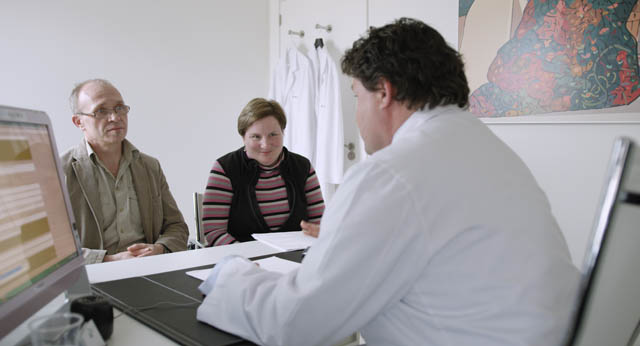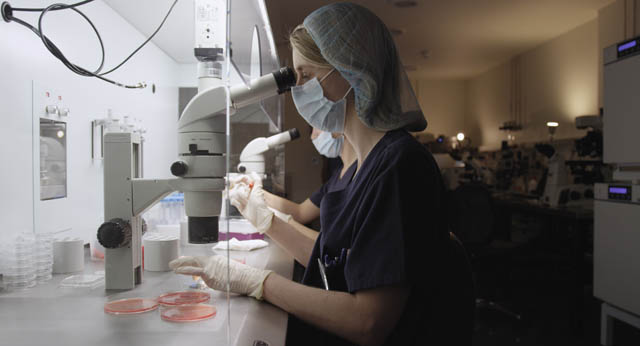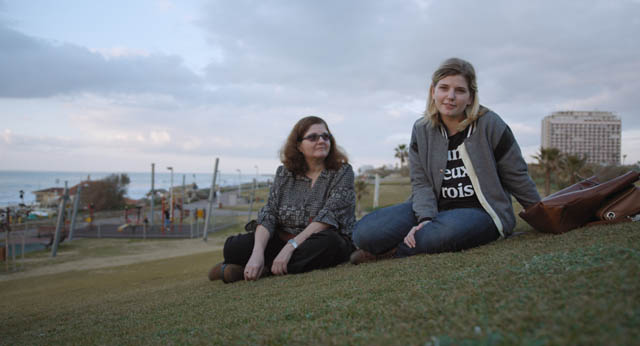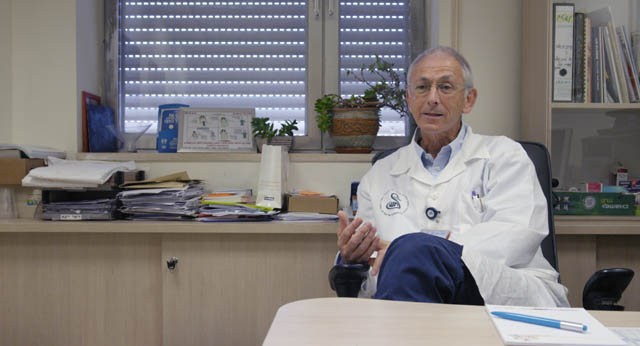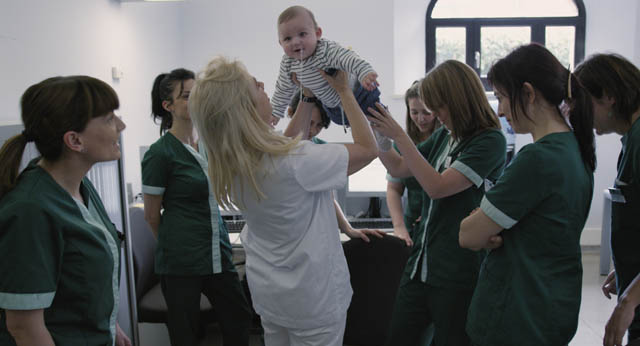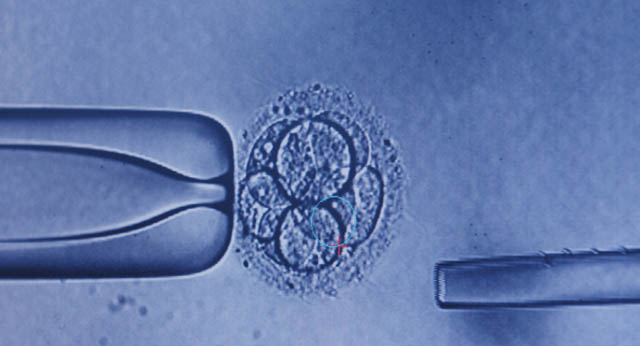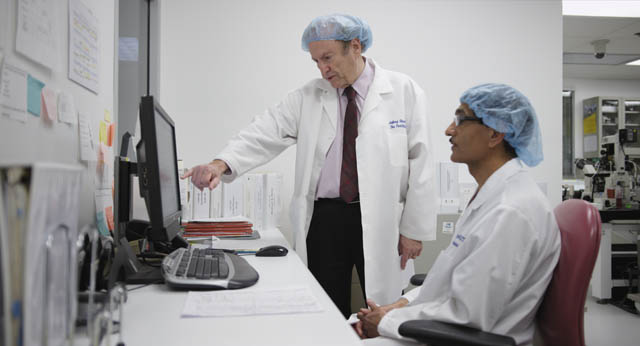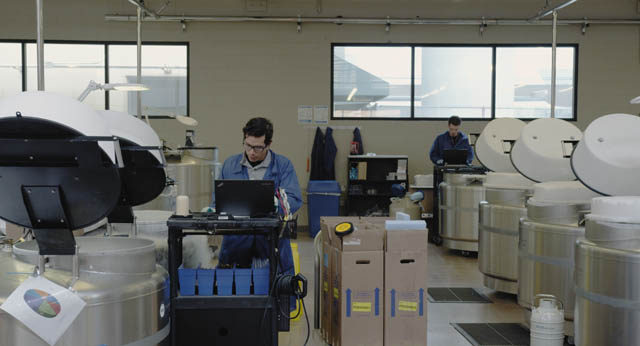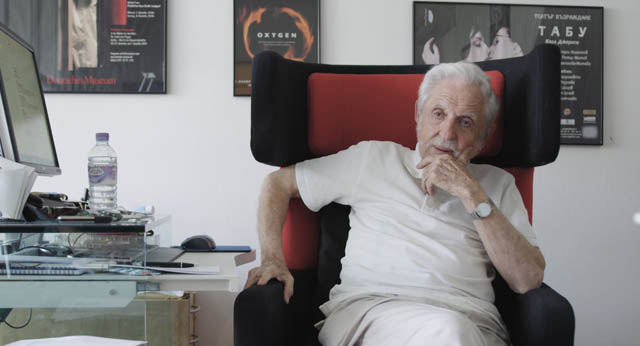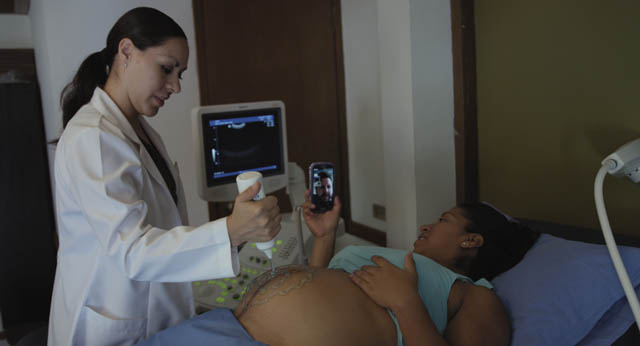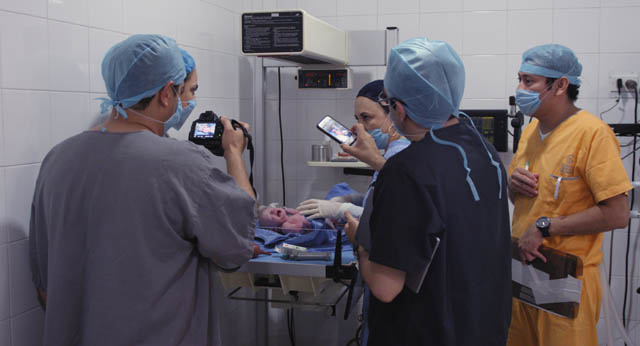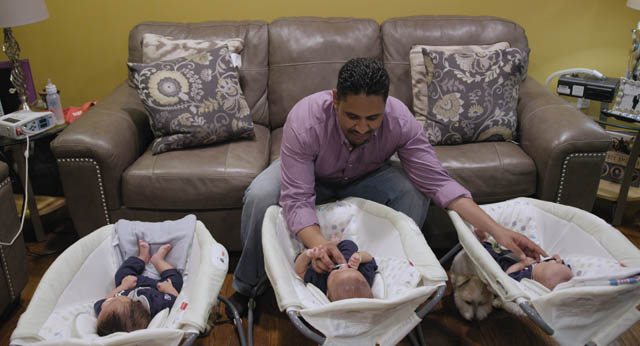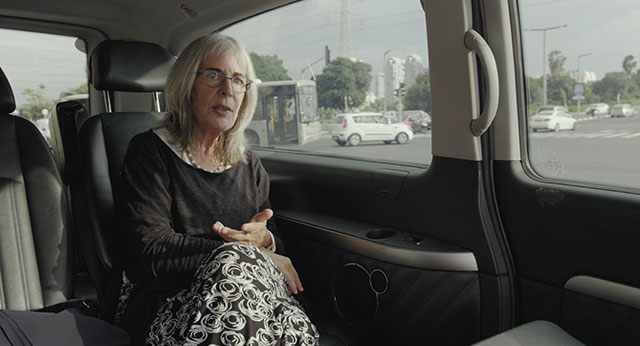FUTURE BABY beleuchtet das komplexe Feld medizinisch-technisierter Geburtenkontrolle aus unterschiedlichen Perspektiven. Rund um den Globus besucht Maria Arlamovsky MedizinerInnen, WissenschafterInnen und TechnikerInnen in Kliniken und sterilen Laboratorien, begleitet Paare mit Kinderwunsch, Eizellenspenderinnen und Leihmütter zu Untersuchungen und Eingriffen. Sie lässt BefürworterInnen und SkeptikerInnen zu Wort kommen und spricht mit der ersten Generation künstlich gezeugter Kinder. In diesem polyphonen Mosaik entfaltet sich die Ambivalenz der revolutionären Technologien und Verfahren, deren Konsequenzen wie auch ethische und juristische Grenzen (noch) nicht eindeutig sind und heftig debattiert werden: Wie weit soll und darf die Natur manipuliert werden?
Ohne diese Frage explizit zu beantworten zeichnet der Dokumentarfilm ein besorgniserregendes Szenario: Untersuchungen, Tests, Eingriffe, Korrekturen. Was ursprünglich damit begann, den Kinderwunsch unfruchtbarer Paare zu erfüllen, aber auch Embryonen aufgrund bestimmter genetischer Dispositionen zu selektieren, hat sich zu einem lukrativen Wirtschaftssektor entwickelt. Als solcher bedient dieser nicht nur das Bedürfnis nach „Risikoprävention“, sondern verleiht dem Kind, einem „Produkt der Liebe“, Warencharakter. Das Wunschbaby aus der Fabrik: Biologische Uhren werden zurückgedreht, menschliche „Brutkästen“ eingekauft, Körper gezielt „verbessert“, unerwünschte Merkmale aussortiert. Kontrollphantasmen, die unterschiedliche Diskurse berühren, Weiblichkeit und Elternschaft neu definieren – vor allem aber die dringliche Frage aufwerfen, was mit unseren Vorstellungen von einem lebensfähigen, „gesunden“ Körper geschieht.
Darf ein Individuum existieren, das die propagierten Schönheits- und Gesundheitsideale nicht erfüllt? Was bedeutet es für unsere zukünftige Gesellschaft, wenn sich biologische Grenzen auflösen und sich Technik in den Ursprung des Lebens – das „Wunder der Natur“ – einschreibt? Eine ebenso unheimliche wie informative – und nicht zuletzt bildgewaltige – Bestandsaufnahme der Gegenwart unserer Zukunft.
"Der Film hat uns alle nachhaltig beeindruckt und wird uns über das Festival hinaus beschäftigen. Ohne Wertung aber mit genauer und konsequenter Beobachtung hinterfragt die Filmemacherin den Wunsch nach Elternschaft in der westlichen Welt. Gibt es ein Recht auf Kinder um jeden Preis? Die Jury gratuliert Maria Arlamovsky zu ihrem Film." Special Mention, Zurich Film Festival 2016
Pressestimmen
"Maria Arlamovsky gewährt vielschichtige Einblicke in die Entwicklung einer erschreckenden Fortpflanzungsindustrie, vor der wir nicht die Augen verschließen sollten." Film.at
"Die Regisseurin behandelt das sensible Thema einfühlsam, aber kritisch." Wiener Zeitung
"Sensibel und niemals wertend." Celluloid
"Arlamovsky’s strong film gives one of their adorable infants the last word." The Hollywood Reporter
FUTURE BABY is a film about the future of human reproduction as it is happening right before our eyes. Maria Arlamovsky’s exploration takes her all around the world—to patients and researchers, to egg donors and surrogate mothers, to laboratories and clinics. The hopes and wishes of future parents mesh with research on how to "upgrade" human embryos in the face of an ever-accelerating rate of progress. How far do we want to go?
Synopsis
FUTURE BABY examines the complex field of reproductive medicine and technology from a variety of perspectives. Maria Arlamovsky travels the globe to visit doctors, scientists, and technicians in hospitals and sterile laboratories. She accompanies couples longing for a child as well as egg donors and surrogate mothers on their journeys through medical appointments and procedures. In this documentary, both supporters and skeptics have a chance to speak, along with the first generation of artificially conceived children. From this complex mosaic, a vision emerges that reflects the ambivalence surrounding these revolutionary technologies and procedures whose consequences we still dont know and whose ethical and legal boundaries are the subject of heated debate: How much can and should we humans interfere with nature?
Without explicitly answering this question, FUTURE BABY paints a worrisome scenario: examinations, tests, procedures, corrections. What originally began as an attempt to help infertile couples have a child, but also to select embryos based on certain genetic predispositions, has today become a lucrative business. As such, it not only caters to our desires around “risk prevention” but also, in some ways, commodifies the child, the “product of our love.” Factory-made designer babies: Biological clocks are turned back, human “incubators” acquired, bodies selectively “improved,” and undesirable features culled. Fantasies of control, touching on various discourses, are redefining what it means to be a woman or a parent. But above all, we are faced with the fundamental question of how we conceptualize viability and health: What right to exist does an individual have who does not meet our societal standards for beauty and health? What does it mean for our future when biological boundaries disintegrate and the origins of life—the “miracle of nature”—begin to fall under the purview of technology? FUTURE BABY presents us with a visually stunning snapshot of the future, which has already arrived, a snapshot that is as disturbing as it is informative.
Press clips
"Arlamovsky’s strong film gives one of their adorable infants the last word." The Hollywood Reporter
"We were thrilled to welcome director Maria Arlamovsky to the Festival to introduce this fascinating and engaging documentary which clearly resonated with the Festival audience scoring a record 4.83 out of 5!" Silver Punt Audience Award for Best Documentary, Cambridge Film Festival
Excerpts
„What I later learned is that the doctors operating in this industry wear two hats at the same time – they wear their medical hat and they wear their business hat.”
Miriam Zoll, journalist & author, USA
„Everything in this room is intended to never let the eggs or sperm know they had ever left the body.”
Dr. Jeffrey Steinberg, The Fertility Institutes, USA
„We are constantly pushing the edge. And I always say, never put handcuffs on scientists. It’s detrimental. Allow the scientists to work. You can regulate and watch them but let them do their thing.“
Dr. Jeffrey Steinberg, The Fertility Institutes, USA
„Now the kitchen is paid off. So now we can take out a loan for the same amount as for our kitchen and get ourselves a baby.“
Carol Anne and Norbert Utz
„When I was younger I wanted to know my father or sperm donor - it depends how you look at it. When I realized I couldn’t, I think that was the hardest part. Not the fact that my family is different, but the fact that I don’t know who my father is, I don’t know half of my roots, I don’t know half of my heritage.”
Noa und Ruth Shidlo, Shorashim, Israeli Donor Families, Israel
„I’m a mother. If I couldn’t have kids, I would want someone to help me, too. Also, there is financial compensation, which I can really use.“
Susa*, egg donor, Spain
„There are soldiers of whom the sperm was extracted, even post mortem and was frozen because of the demand of the family. … Some of these men were not married. So the question is always what do to do with this sperm. What egg cells are you using, who is going to be pregnant with them, what’s the future of the baby who was conceived with the sperm of a dead father.
Prof. Jaron Rabinovici, fertility specialist, Sheba Medical Center, Israel
The same problem can also occur with a woman who froze her egg unfortunately is not alive any more. Then you create a baby without the mother being alive at all.”
“It’s about having a right to be a parent. … And in it’s extreme versions it’s more of a consumer right. In other words: It goes from being a wish or a desire, to immediately becoming a need and a right. … But what does it mean when we say we have a right to parenthood? Does it mean by whatever means?” Prof. Carmel Shalev, bioethicist, Israel„Now I’m here to have one last child, maybe even twins, and then that’s it. I had IVF done five years ago. There were embryos left and I had them frozen. So I had to go through the whole painful process again.”
Dana*, patient Sheba Medical Center, Israel
„If a baby is born with an anomaly today the gynecologist is asked by the parents or the law or a part of society whether this hadn’t been foreseeable during pregnancy.”
Marisa Lopez-Teijon, CEO Institut Marques, Spain
„I’m now doing a biopsy with the young embryo. A beautiful embryo, 8 cells, wonderful. They were thawed today, they were frozen embryos. Now I’m pulling out the cell. The embryo will stay in the lab to grow. And the cell will be sent to genetics, they will give us the information whether this embryo is healthy or not.”
Mascha*, embryologist, Israel
„I think that in advanced societies we won’t tolerate that children are being born with illnesses, the same way we won’t tolerate that someone dies of cancer, or that someone dies on the highway for driving too fast.”
Marisa Lopez-Teijon, CEO Institut Marques, Spain
„We are starting to externalize more and more of human reproduction. The production of gametes, potentially there are wombs one day and certainly the fertilization process. This is a slow, yet significant shift in human evolution. … We have been slowly shifting human evolution ever since we started making technology. But it’s one that really strikes to the essence of creation.”
Andrew Hessel, biotechnician, USA
„But the decision making process about which lives are unworthy of life is the one we are normalizing. And we do it clean and scientifically and there are no actual lives being destroyed. …And then there along comes a truck and you have got a kid with impediment anyway. So it’s not like you are actually choosing the kind of child you want to raise.”
Prof. Barbara Katz-Rothman, sociologist, USA
„We store any reproductive tissue: eggs, embryos, sperm. … We store them in liquid nitrogen, which keeps them at about minus 400 degrees Fahrenheit. It keeps them stored in a status of suspended animation. As long as the tissue stays frozen it can be viable forever. 30 years, 40 years, it won’t matter. You can come back, thaw an embryo, or sperm or egg and potentially create a child.”
Scott Brown, California Cryobank, USA
Stab
| Regie & Buch | Maria Arlamovsky (Regiestatement) |
|---|---|
| Kamera | Sebastian Arlamovsky |
| Schnitt | Natalie Schwager |
| Ton | Sergey Martynyuk Johannes Winkler |
| Tonschnitt & Sounddesign | Andreas Hamza |
| Tonmischung | Thomas Pötz, Cosmix Studios |
| Musik | Vincent Pongracz Alana Newman |
| Dramaturgische Beratung | Michael Palm |
| Recherche & Aufnahmeleitung | Daniela Mautner Markhof |
| Produktionsleitung | Katharina Posch Flavio Marchetti Lixi Frank |
| Herstellungsleitung | Michael Kitzberger |
| Produzenten | Michael Kitzberger Wolfgang Widerhofer Nikolaus Geyrhalter Markus Glaser |
| Produktion: | NGF - Nikolaus Geyrhalter Filmproduktion GmbH |
| Weltvertrieb: | Autlook Filmsales |
| Mit Unterstützung von: | Österreichisches Filminstitut Filmfonds Wien ORF Film/Fernsehabkommen FISA - Filmstandort Austria ZDF/3sat |
Personenregister
| Miriam Zoll | Journalistin, Autorin |
|---|---|
| Jeffrey Steinberg | CEO, The Fertility Institutes |
| Renata Huttelova | Embryologin, IVF Cube |
| Michal Jelen | Operation Manager, IVF Cube |
| Carol Anne und Norbert Utz | |
| Jon Aizpurua | CEO, IVF Spain |
| Noa and Ruth Shidlo | Shorashim, Israeli Donor Families |
| Jaron Rabinovici | Spezialist für Reproduktionsmedizin, Sheba Medical Center |
| Carmel Shalev | Bioethikerin, University of Haifa |
| Lilly Frost | My Donor Cycle Agency, Surrogacy Beyond Borders |
| Marisa Lopez-Teijon | CEO Institut Marquès |
| Andrew Hessel | Biotechnologe, Autodesk Research |
| Barbara Katz-Rothman | Soziologin, City University of New York |
| Scott Brown | California Cryobank |
| Carl Djerassi | 2015 verstorben, Entwickler der Pille, Autor |
| Anna Smajdor | Bioethikerin, University of East Anglia |
| Evelyn Escorza | Cefam Agency |
| Haseeb, Christy und Grayson Amireh | Vanessa, Sean, Jackson, Jordy und Jaden Soman |
Zitate
„Was ich erst später verstanden habe, ist, dass Ärzte in dieser Industrie zwei Hüte tragen.
Miriam Zoll, Journalistin & Autorin, USA
Sie sind gleichzeitig Arzt und Verkäufer.“
„Es geht um das Recht auf Elternschaft. ... Und in seiner extremsten Variante ist es eher ein Konsumentenrecht. Mit anderen Worten: Es entwickelt sich von einem Wunsch oder einem Verlangen sofort zu einem Bedürfnis und einem Recht. ...
Prof. Carmel Shalev, Bioethikerin, Israel
Was bedeutet es, wenn wir sagen, wir haben ein Recht auf Elternschaft? Bedeutet das, um jeden Preis?“
„Es gibt schon allerlei Kliniken in verschiedenen Ländern, die Eier von jungen Frauen zur Versicherung einfrieren. Ich würde nicht nur das tun, ich würde mich dann auch sterilisieren lassen, und nie mehr wieder Verhütung gebrauchen, und nicht Tausende Euro für Verhütung ausgeben, mit denen ich sehr leicht die In‑Vitro‑Fertilisation bezahlen kann.“
Carl Djerassi (verstorben 2015), Entwickler der Pille, Autor
Regiestatement – Maria Arlamovsky
Kinder sind für mich ein wichtiger Teil meines Lebens, ein Teil, den ich - trotz aller Anstrengung - nicht missen möchte. Ich verstehe Menschen, die Kinder bekommen und großziehen wollen, und als Hetero- oder Homo-Paar oder auch Single als Familie leben wollen.
Die Möglichkeit, ein zuerst mal fremdes Kind zu adoptieren oder als Pflegekind aufzunehmen, sich Ämtern stellen und begründen zu müssen, warum man unbedingt ein Kind will, nachzuweisen, ob man ausreichend Ressourcen für dieses Unterfangen hat, nehmen viele als schwierig wahr - und steht auch (noch) nicht allen offen.
Planbarer, und verbunden mit dem Wunsch, etwas biologisch „Eigenes“ im zukünftigen Kind wiederzufinden, erscheint der Weg, erst mal Hormone zu spritzen, um mehr Eizellen zu produzieren, ins Gläschen zu ejakulieren und darauf zu hoffen, dass sich der nicht unbeträchtliche finanzielle Aufwand auch gelohnt hat.
Inzwischen sollen seit 1978, so schätzt man, 5 Millionen Kinder geboren worden sein, die ohne Sex, aber dank Wissenschaft, Pharmazeutika und ärztlichem Können das Licht der Welt erblickt haben. Kinder, die - in den meisten Fällen - froh sind zu leben, die nicht schief angeschaut werden wollen als Retortenbaby oder Versuchskaninchen. Wunschkinder eben, von Eltern, die sich sehr dringend ein Kind gewünscht haben.
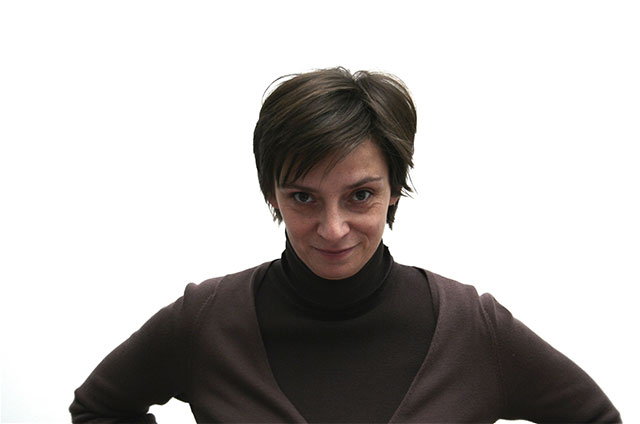
Die tatsächliche Baby-Take-Home-Rate bei künstlichen Befruchtungen betrug in Österreich 2013 lediglich 26%. Heute gibt es Statistiken, die besagen, dass man vor dem sechsten IVF Versuch nicht aufgeben sollte. Daraus entsteht auch ein lukratives Geschäft. Ähnlich wie bei der Schönheitsmedizin vermarktet die Reproduktionsmedizin einen Wunsch, der etwas erfüllen soll, was man einfach nicht hat, auch nicht unbedingt wirklich braucht, sich aber sehnlichst erhofft.
Diese Hoffnung und die Wünsche der Eltern in spe, die Angebote der Kliniken, Spitäler und Ärzteschaft, und die Visionen von WissenschafterInnen, die hier ineinandergreifen, haben mich bei der Arbeit an FUTURE BABY fasziniert. Jeder scheint vor sich hinzuarbeiten, aber den Überblick verloren zu haben, die notwendige Distanz zu einer Entwicklung, aus der zwar tatsächlich Kinder entstehen, wobei aber vieles auf dem Weg dorthin übersehen wird.
FUTURE BABY gibt keine Antworten, aber FUTURE BABY will Bilder zusammenführen, die sonst gerne voneinander getrennt werden. Junge Eizellspenderinnen, die des Geldes wegen ihre Keimzellen gerne und freiwillig anbieten, Leihmütter, die mit dem Austragen fremder Embryonen ihren eigenen Kindern eine bessere Zukunft bieten möchten, und Menschen, die durch Zellen Dritter erzeugt wurden, treffen auf jene, die all das gerne ausblenden auf dem Weg hin zum Kind.
Ich wollte erkunden, wohin uns diese rasanten Entwicklungen der Reproduktionsmedizin, Genetik und Geburtenkontrolle führen; ich denke, wir sollten dringend beginnen, uns Fragen zu stellen - wie weit wollen wir eigentlich gehen?
Team
| Director & Screenplay | Maria Arlamovsky (Director’s Statement) |
|---|---|
| Photography | Sebastian Arlamovsky |
| Editing | Natalie Schwager |
| Sound recording | Sergey Martynyuk Johannes Winkler |
| Sound Cut & Sounddesign | Andreas Hamza |
| Sound Mix | Thomas Pötz, Cosmix Studios |
| Color and mastering | Simon Graf |
| Retouching | Matthias Halibrand Simon Graf |
| Music | Vincent Pongracz Alana Newman |
| Script consultant | Michael Palm |
| Research & production coordinator | Daniela Mautner Markhof |
| Additional research | Jessica Lind Marie Hofbauer Rica Linders Samira Ghahremani Bo Chen Gisela Kato |
| Production managers | Katharina Posch Flavio Marchetti Lixi Frank |
| Line Producer | Michael Kitzberger |
| Producers | Michael Kitzberger Wolfgang Widerhofer Nikolaus Geyrhalter Markus Glaser |
| Production: | NGF - Nikolaus Geyrhalter Filmproduktion GmbH |
| With support from: | Österreichisches Filminstitut Filmfonds Wien ORF Film/Fernsehabkommen FISA - Filmstandort Austria ZDF/3sat |
Cast
| Miriam Zoll | Journalist, author |
|---|---|
| Jeffrey Steinberg | CEO, The Fertility Institutes |
| Renata Huttelova | Embryologist, IVF Cube |
| Michal Jelen | Operations manager, IVF Cube |
| Carol Anne und Norbert Utz | |
| Jon Aizpurua | CEO, IVF Spain |
| Noa and Ruth Shidlo | Shorashim, Israeli Donor Families |
| Jaron Rabinovici | Fertility specialist, Sheba Medical Center |
| Carmel Shalev | Bioethicist, University of Haifa |
| Lilly Frost | My Donor Cycle Agency, Surrogacy Beyond Borders |
| Marisa Lopez-Teijon | CEO Institut Marquès |
| Andrew Hessel | Biotechnician, Autodesk Research |
| Barbara Katz-Rothman | Sociologist, City University of New York |
| Scott Brown | California Cryobank |
| Carl Djerassi (2015 deceased) | Inventor of the contraception pill, Author |
| Anna Smajdor | Bioethicist, University of East Anglia |
| Evelyn Escorza | Cefam Agency |
| Haseeb, Christy und Grayson Amireh | Parents |
| Vanessa, Sean, Jackson, Jordy und Jaden Soman | Parents and triplets |
Director’s statement – Maria Arlamovsky
Children are an important part of my life, a part that despite the effort I would not want to miss. I understand why people want to have and raise children and want to live as a family, be it in a straight or gay relationship or as a single parent.
Adopting a child who comes with a lot of unknowns or taking in a foster child, having to deal with officials and justifying why you want to have a child, proving that you have sufficient resources, etc., appears difficult to many and is not yet an option for all. Injecting hormones to produce more eggs, ejaculating into a jar, and hoping that the considerable financial effort will pay off seems, in a way, more predictable.
It is estimated that since 1978, 5 million children have been born who were not conceived through parental sex but through science, pharmaceuticals, and medical technology—children who (most of the time) are happy to be alive and don’t want to be viewed as test-tube babies or guinea pigs. They are planned children of parents who very much wanted “their” child.

But in 2013, for example, the actual live birth rate for IVF in Austria was only 26 percent. Today there are statistics that say one shouldn’t give up before the sixth IVF attempt. That makes for lucrative business. Similar to cosmetic surgery, reproductive medicine capitalizes on the desire to get what we don’t have—something we don’t absolutely need but desperately hope to attain.
The hopes and wishes of prospective parents, the promises of clinics, hospitals, and physicians, and the visions of scientists working in the field, as well as how these different aspects interact, have fascinated me throughout my work on FUTURE BABY. Everyone seems to be trudging along on their own track while losing sight of the bigger picture, too close to see the trajectory of a development that does lead to children but has other social, psychological, and ethical consequences as well that are often overlooked.
FUTURE BABY does not provide any answers, but it does try to bring together images that are usually kept apart. Young egg donors who offer their eggs willingly and gladly because of monetary compensation, surrogate mothers who hope to provide a better future for their own children by carrying a genetically unrelated embryo for someone else, and people who were themselves conceived with the genetic material of someone they dont know meet those who would prefer not to think about all of this on their quest for a child of their own.
With FUTURE BABY, I wanted to explore where the rapidly developing fields of reproductive medicine, genetics, and birth control are taking us, and I believe we have come to a point where it is imperative that we ask ourselves, “how far do we want to go?”
Schulvorstellungen
Schulvorstellungen sind individuell buchbar in jedem Kino österreichweit bzw. auf
www.kinomachtschule.at und www.schulkino.at
Das Unterrichtsmaterial finden Sie hier:
http://kinomachtschule.at/data/futurebaby.pdf
Schulkinotermine können auch mit anderen Kinos vereinbart werden. Hierfür bitte Kontaktaufnahme mit dem jeweiligen Kino vor Ort bzw. mit dem Filmladen.
Downloads
You can download a .zip-File with press kit, poster and stills here:
Download Press Kit (Stills and PDFs, 38.7 MB)
© NGF
Please be aware that these photos are available exclusively for work associated with the film, duplication for use elsewhere is prohibited without express permission.
© Nikolaus Geyrhalter Filmproduktion GmbH
DVD & ONLINE
Und auf DVD
Auch hier: watch.austrianfilms.com, in den Mediatheken von A1 und UPC, bei Amazon und bei iTunes.
Sondervorführung: Es gibt die Möglichkeit, im Kino bei Ihnen in der Nähe eine eigene Vorführung von FUTURE BABY ab einer gewissen Gruppengröße zu vereinbaren. Hierzu wenden Sie sich bitte direkt an das jeweilige Kino bzw. an Frau Judith Andlinger j.andlinger@filmladen.at
New: Spin-off documentary
FATHER MOTHER DONOR CHILD
watch now at Vimeo on Demand
by director Maria Arlamovsky
Preise

Lobende Erwähnung
Zurich Film Festival (2016)
"Eine lobende Erwähnung möchten wir für den österreichischen Dokumentarfilm FUTURE BABY von Maria Arlamovsky aussprechen. Der Film hat uns alle nachhaltig beeindruckt und wird uns über das Festival hinaus beschäftigen. Ohne Wertung aber mit genauer und konsequenter Beobachtung hinterfragt die Filmemacherin den Wunsch nach Elternschaft in der westlichen Welt. Gibt es ein Recht auf Kinder um jeden Preis? Die Jury gratuliert Maria Arlamovsky zu ihrem Film." Jurybegründung Zurch Film Festival
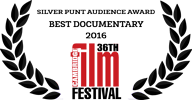
Silver Punt Publikumspreis für den Besten Dokumentarfilm
Cambridge Film Festival (2016)
"Future Baby is a film about the future of human reproduction as it is happening right before our eyes. Maria Arlamovsky’s exploration takes her all around the world - to patients and researchers, to egg donors and surrogate mothers, to laboratories and clinics. We were thrilled to welcome director Maria Arlamovsky to the Festival to introduce this fascinating and engaging documentary which clearly resonated with the Festival audience scoring a record 4.83 out of 5!" Jurybegründung Cambridge Film Festival
Festivals
Hot Docs Canadian International Documentary Festival Toronto
Docaviv International Film Festival, Tel Aviv
Zurich Film Festival
DokLeipzig. Internationales Leipziger Festival für Dokumentar- und Animationsfilm
DMZ International Documentary Film Festival, Goyang, Südkorea
Reykjavik International Film Festival
International Contemporary Science Film Festival 360°, Moskau
Cambridge Film Festival
Rocky Mountain Women's Film Festival, Colorado Springs
Marda Loop Justice Film Festival, Calgary
Diagonale, Festival des österreichischen Films, Graz
USA & Canada:
Ab 13. Dezember 2016 als Video on Demand auf iTunes, Google Play, Amazon VoD, Vimeo,...
Release
Worldwide:
Watch ONLINE at Vimeo
DVD now available
USA & Canada:
Watch online: Video on Demand
iTunes USA – http://apple.co/2h4SGAR
iTunes Canada – http://apple.co/2h4Wi6b
Austria:
Cinema Release: April 15, 2016
New: Spin-off documentary
FATHER MOTHER DONOR CHILD
watch now at Vimeo on Demand
by director Maria Arlamovsky
Awards

Honorable Mention
Zurich Film Festival (2016)

Silver Punt Audience Award for Best Documentary
Cambridge Film Festival (2016)
"Future Baby is a film about the future of human reproduction as it is happening right before our eyes. Maria Arlamovsky’s exploration takes her all around the world - to patients and researchers, to egg donors and surrogate mothers, to laboratories and clinics. We were thrilled to welcome director Maria Arlamovsky to the Festival to introduce this fascinating and engaging documentary which clearly resonated with the Festival audience scoring a record 4.83 out of 5!"
Festivals
Hot Docs Canadian International Documentary Festival Toronto
Docaviv International Film Festival, Tel Aviv
Zurich Film Festival
DokLeipzig. Internationales Leipziger Festival für Dokumentar- und Animationsfilm
DMZ International Documentary Film Festival, Goyang, Südkorea
Reykjavik International Film Festival
International Contemporary Science Film Festival 360°, Moskau
Cambridge Film Festival
Rocky Mountain Women's Film Festival, Colorado Springs
Marda Loop Justice Film Festival, Calgary
Diagonale, Festival des österreichischen Films, Graz
KONTAKT & IMPRESSUM
NGF Nikolaus Geyrhalter Filmproduktion GmbH
Silvia Burner
Hildebrandgasse 26, A-1180 Vienna
T +43.1.403.01.62
burner@geyrhalterfilm.com
www.geyrhalterfilm.com
Weltvertrieb
Autlook Filmsales GmbH
Salma Abdalla
Spittelberggasse 3/14, A-1070 Vienna
T +43.720.3469.34
welcome@autlookfilms.com
www.autlookfilms.com
Festivalkoordination
Austrian Film Commission
Anne Laurent
Stiftgasse 6, A-1070 Vienna
T +43.1.526.33.23.203
festivals@afc.at
www.afc.at
Verleih in Österreich
Filmladen Filmverleih GmbH
Mariahilfer Straße 58/7
A-1070 Wien
T +43/1/523 43 62-0
marketing@filmladen.at
www.filmladen.at
Contact
NGF Nikolaus Geyrhalter Filmproduktion GmbH
Silvia Burner
Hildebrandgasse 26, A-1180 Vienna
T +43.1.403.01.62
burner@geyrhalterfilm.com
www.geyrhalterfilm.com
World sales
Autlook Filmsales GmbH
Salma Abdalla
Spittelberggasse 3/14, A-1070 Vienna
T +43.720.3469.34
welcome@autlookfilms.com
www.autlookfilms.com
Festival coordination
Austrian Film Commission
Anne Laurent
Stiftgasse 6, A-1070 Vienna
T +43.1.526.33.23.203
festivals@afc.at
www.afc.at
Distribution in Austria:
Filmladen Filmverleih GmbH
Mariahilfer Straße 58/7
A-1070 Wien
T +43/1/523 43 62-0
marketing@filmladen.at
www.filmladen.at
IMPRINT
Nikolaus Geyrhalter Filmproduktion GmbH
Hildebrandgasse 26
A-1180 Vienna
T/F: +43-1-403 01 62
email: info(AT)geyrhalterfilm.com
Authorised to represent
Nikolaus Geyrhalter, CEO
Michael Kitzberger, Partner
Markus Glaser, Partner
Commercial Court Vienna, TR 230444p
ATU 56474808
Disclaimer
Contents
The contents of our pages have been compiled using the utmost diligence and care. We do not, however, support or endorse the accuracy or topicality of any contents on our pages.
As a service provider we are responsible for our own contents on these pages, pursuant to common law. Service providers are, however, not obligated to monitor any external information referred or stored by them, nor to investigate into any circumstances indicating an unlawful activity. Obligations to remove or block the use of information pursuant to common law are not affected. Liability, however, is only endorsed from the time a concrete unlawful act will be made known to us. We will remove any and all unlawful contents as soon as we are informed of their existence.
No legal relationship between Nikolaus Geyrhalter Filmproduktion GmbH and the user, of whatsoever kind, is established by the information provided on these pages.
This disclaimer is part of any Internet offer from which this page was referred.
Links and referrals
Our offer comprises links to external web pages of third parties whose contents are beyond our influence. We therefore reject any liability for these external contents. The contents of such referred pages are the competence of the relevant supplier or owner of the relevant pages. The referred pages were checked for possible infringements at the time of referral. No unlawful contents were recognised at the time of referral. A permanent control of the contents of the referred pages is, however, not deemed reasonable without any concrete clues to a possible infringement. Any and all links referring to pages with unlawful contents will be removed as soon as we are informed of their existence.
Copyright
The owners of these pages make every effort to respect the copyrights of others and/or to use their own or license-free material.
The contents and works on these pages are subject to copyright. Contributions of third parties are identified as such. Any duplication, revision, diffusion as well as any kind of exploitation beyond the copyright scope of application require the written consent of the relevant author or compiler.
Any unauthorised duplication and/or diffusion of these pages constitutes a breach of the Austrian Copyright Law (UrhG).
Data protection
The use of contact data published in the Impressum by third parties, for the purpose of not explicitly requested advertising and information material, is hereby expressly rejected. The owners of these pages expressly reserve the right to take legal action in case of unrequested transmission of advertising information, e.g. through spamming.



